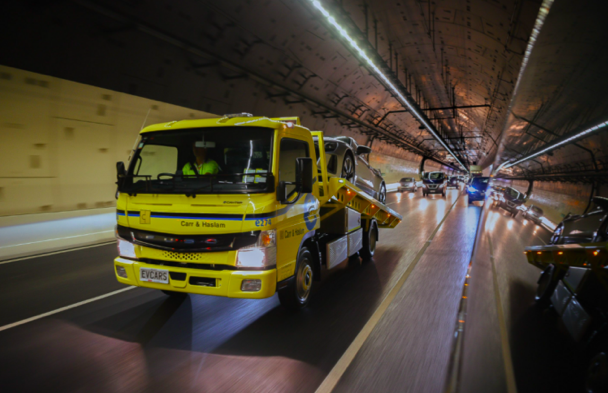One of New Zealand’s oldest transport companies is now delivering electric vehicles on the back of its very first battery electric truck.
Carr and Haslam has put a new Fuso eCanter into its fleet for deliveries of cars and light EVs into Central Auckland.
It showcased the light-duty zero emissions truck at a special launch event on Monday morning with the delivery of an electric Audi e-tron from its Mt Wellington base to Giltrap Audi in Grey Lynn.
It marked the first delivery of its kind in New Zealand and the vehicle transport company is promising there will be more to come. From there, the eCanter then travelled a few kilometres down the road to Giltrap Škoda and picked up an all-electric Škoda Enyaq – the brand’s very first EV.

Carr & Haslam was awarded $140,549 from the Government’s Low Emission Vehicles Contestable Fund to go towards the eCanter trial.
The truck is also expected to be used for vehicle recovery from breakdowns and enforcement in the proposed Auckland Zero Emissions Area (ZEA).
The eCanter marks a special milestone for Carr & Haslam which was founded in 1862 and once moved goods by horse and cart.
The company has always been at the forefront of technology and was one of the first in the country to introduce its first petrol powered truck in 1922 by then owner George Carr.
That was when New Zealand was just coming out of a pandemic and recovering from World War I.
One hundred years later, the company is again taking a lead in road transport, this time through battery electric adoption.
“My grandfather proudly stood in Grey Lynn back in 1922, when he lined his first internal combustion engine (ICE) truck ahead of the technology of the day: horses and carts,” director and fifth-generation operator Chris Carr says.
“The introduction of a Fuso eCanter electric truck to our fleet today is just as big of a deal as the step to the petrol-powered Brockway was then.
“Furthermore, the move to today’s new technology is every bit as important,” Carr says.
He says the “biggest challenge” for companies adopting commercial EVs is the cost and it couldn’t be done without support from the Energy Efficiency and Conservation Authority (EECA) which administers the government funding.
“Having worked through the overhead cost, we can now work through the technical challenges of integrating the vehicle into our fleet. We’ve already learnt a lot and expect to learn a lot more.
“Where current highly efficient diesel powerplants have benefitted from decades of development and refinement, EV is still in its infancy. We cannot apply an EV to our business in the same way we would another diesel truck and we now need to learn and adapt our operations around it.
“The good news is that we know the development of EV trucks will advance at a very high rate and will soon reach much higher levels of efficiency and with lower levels of cost,” Carr says.
EECA transport portfolio manager Richard Briggs says he’s pleased to see Carr & Haslam among the first early adopters of electric heavy freight.
“Heavy vehicles have an outsized impact on transport emissions, so low-emissions options are vital to decarbonising the sector.
“We’re looking forward to seeing more and more low-emissions heavy trucks on the roads,” Briggs says.
Fuso NZ sales and customer experience general manager Kathy Schluter says there are more eCanters due to arrive into the country and the Fuso team will be assisting customers with the new technology.
Five eCanters are already included in an Auckland Transport inner city zero emissions area (ZEA) trial with participants Mainfreight, Bidfood, Toll Global Express, Owens Transport and Vector OnGas. Genesis Energy also has an eCanter in its fleet for delivery of LPG bottles around Auckland.
“Fuso’s commitment to the delivery of electric trucks in New Zealand will amplify our country’s renewable electricity advantage, and accelerate the need to decarbonise vehicle fleets to deliver on the Government’s climate change goals.
“Nimble, quiet and environmentally friendly, the trucks are specifically made for the city environment. We are delighted to team up with our major clients to learn and lead together to deliver a sustainable future for our country,” Schluter says.
The eCanter is powered by an 81kWh (420v) lithium-ion, liquid-cooled battery pack. It delivers 135kW of power and 390Nm of torque, which provides a range of up to 150km on a single charge.
The drivetrain is fitted to a standard 3.4m wheelbase and Fuso Canter cab chassis, meaning customers and bodybuilders will be working with the same familiar frame.
A standard CCS2 plug is used for charging, with downtime minimised with DC fast charge capability that will have the battery at 80% capacity in less than one hour, the company says.
The eCanter comes equipped with an AC charge cable (max 32A), which will allow a full charge overnight using off-peak power.








